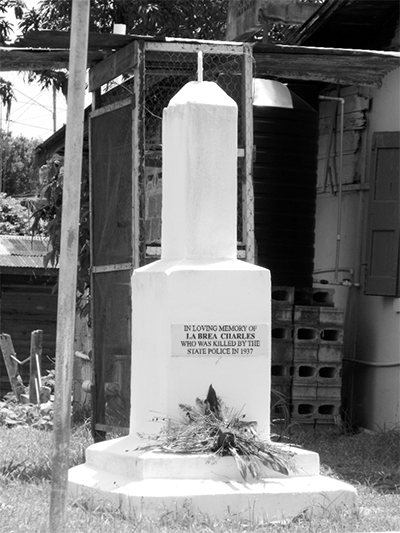 After more than 100 years of crude oil removal by international and national agencies, Fyzabad and surrounding areas remain largely underdeveloped and main street Fyzabad seems to be frozen in time. Many of the youths have no jobs and there are no economic ventures taking place. Are these the same issues of 1937 where citizens have not benefited from the exploitation of their community’s natural resources and continue not to benefit even up to today? —Rudolph Bissessarsingh He came to Fyzabad in 1921 along with hundreds of his countrymen from Grenada to work in the expanding oilfields, and the name of Tubal Uriah ‘Buzz’ Butler will always be associated with that town. In brief, growing discontent with the pay and working conditions at Apex Oilfields and the lack of a unionised workforce saw Butler being thrust to the head of an assembly which, on June 2, 1937, delivered terms to Col Horace Hickling, manager, which were summarily rejected. Butler was charged with sedition and went into hiding. The standoff between labour, the oilfields, and then the police became very tense indeed since Butler could not be apprehended due to the many people who risked their own freedom to keep him out of the hands of the colonial authorities. On June 19, the now-wanted Butler addressed a meeting at the Emporium Hall which was interrupted by several policemen under the charge of Inspectors Power and Liddlelow. One of the officers, Constable Belfon, was delegated to read the arrest warrant which led Butler to ask the crowd “Are you going to let them take me?” The response was an attack of bottles and stones aimed at the police who retreated. Power was struck on the head and later died. Corporal Carl “Charlie” King, who had attempted to lay hands on Butler, was separated from his comrades. He ran to a nearby shop and leaped out the back window, breaking his legs. Kerosene was poured on him by the mob and he was set ablaze. The place where this happened is still known as Charlie King Junction. In the days that followed, Fyzabad became a warzone. The rioters barricaded the main roads into the downtown section and it was a full three days before the charred remains of Corporal King were recovered. An English policeman, W S Bradburn was shot dead while on patrol and in retaliation, the police killed an innocent bystander, La Brea Charles. These tumultuous events made Fyzabad the spiritual birthplace of the modern Trinidadian labour movement and the Labour Day celebrations held here annually include a march which culminates at Butler’s grave site (he died in 1977) in the ironically named Apex Cemetery. A brick Roman Catholic chapel dedicated to St Thomas More was constructed in 1940 and a year later, a new school was founded in an old bungalow donated by Apex Oilfields. This institution was established by a well-known educator and poet of Tobagonian origin named Harold Telemaque. Called the Fyzabad Intermediate Anglican School, this place has risen to become one of the best-regarded secondary schools in the south of the island. A government primary school was constructed at Pepper Village to the north of Fyzabad at a later date. During the 1950s, Fyzabad remained a flourishing town. A new police station was built nearer the settlement since the old Constabulary (still to be seen) occupied an Apex structure and the interests of the oil barons in those days took precedence over the needs of the general populace. In 1960 Apex became part of British Petroleum. The oil boom years of the 1970s saw a spike in the economy of the district with the opening of a large Hi-Lo supermarket, a strip mall, and even a new secondary school. A branch of Barclays (now Republic) Bank was opened there as well. The good times were not to last forever, for with the plummeting of global oil prices, the 1980s brought recession. The old Apex holdings were once again to change hands as they became part of the new national oil company, Trintopec. The straitened times showed itself in the gradual deterioration of the once-posh housing camps, with their swimming pools and tennis courts as well as the closure of Hi-Lo and one of the two cinemas in the town (although the Universal Cinema managed to soldier on until 2004). A new complex inaugurated by the government for the facilitation of cottage industries did little to stimulate self-employment. For many years, Fyzabad remained in a slump, even after a new state oil company, Petrotrin, was incorporated in 1993. It is only within very recent years that there has been some growth of the town and new modern buildings in place of the old ones. A large private park and recreation facility on the old Trinidad Leaseholds Ltd lands is a major attraction. Nevertheless, there is still enough of the old Fyzabad to remind visitors of what was in the roaring heyday of this oil boom town. Source: Virtual Museum of Trinidad and Tobago
0 Comments
Leave a Reply. |
T&T news blogThe intent of this blog is to bring some news from home and other fun items. If you enjoy what you read, please leave us a comment.. Archives
May 2025
Categories
All
|

 RSS Feed
RSS Feed